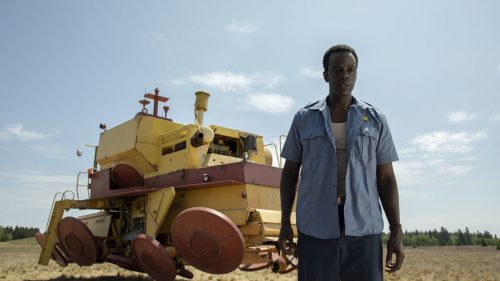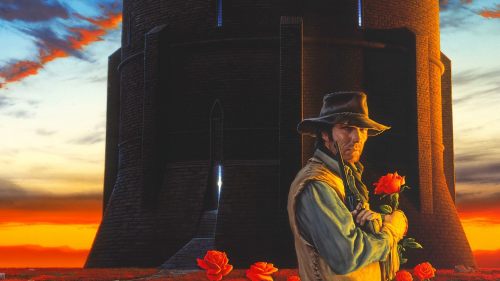THE EXPANSE: To Read Or To Watch?
Everyone be cool, I’m doing this WITHOUT spoilers…
There is so much noise out there when it comes to books you should read and shows you just have to watch. Within my particular orbit, THE EXPANSE frequently shows up as both. The novels - credited to writer James S. A. Corey, who is actually two writers: Daniel Abraham and Ty Franck - have been around since 2011. There are currently eight with a ninth final novel supposedly coming out this year. It doesn’t have a name yet, but that doesn’t matter. I have no idea what the current books are called either. They all have titles like BABYLON’S ASHES and TIAMAT’S WRATH, which all sound cool but tell you nothing about the book itself. Naming device aside, they are very attractive books that look fetching all in a row at the bookstore and not on my Kindle.
More often, however, I hear about the EXPANSE television series. Part of that is because it made news when Amazon rescued the show from cancellation by buying it from Syfy at the end of its third season. The Amazon season popped out in December, so it’s still relatively new. But even without that drama, the show has a fairly enthusiastic fanbase, eager to tell you it’s one of the best science fiction shows you can watch.
The story remains the same regardless of how you get it. THE EXPANSE is a political science fiction story set in a future in which humans have harnessed high-speed space travel, but in a small way relative to other science fiction properties. Earth is still the center of human existence, but we also occupy Mars. Beyond that, people live in/on “The Belt”, the asteroid belt between Mars and Jupiter, as well as some of Jupiter’s moons. I don’t believe they go much further that because it’s all awful dead space and would take too long anyway.
Besides, there is trouble enough with just half a solar system. Rather than one big happy human family, these civilizations away from Earth have developed their own identities and cultures. Mars hates Earths’ supposed superiority and is all about building a super-strong military. The Belters have all evolved into tall skinny people who can barely survive in full gravity and have to live on whatever scraps they can get. The three factions hate each other and war could break out at any moment.
From this general setting, events I won’t spoil put together a ragtag crew of folks, give them a ship, and make them the ongoing center of an evolving conspiracy that is alien in origin but made lethal thanks to layers of human greed, stupidity and politics. There is also a detective who wears a lame trilby hat but has even worse future hair underneath. In the show he is played by Thomas Jane, just so you know we're discussing high-quality entertainment here.
I’d say that covers the first book, and first two seasons of the show in the most general fashion I dare provide. The status quo described doesn’t last very long, but it’s enough to get you going. You’ll at least get an idea of the characters and whether you like them.
Most adapted material has an uncomfortable relationship with its source. Usually, we all generally agree that one version of a story is better than the other, typically whatever the original was (let’s be real, it was a book). THE EXPANSE is a little different. Depending on what aspects you examine, sometimes the show is better than the novels. Sometimes the books win out. You really don’t get the highest quality EXPANSE experience without going through both.
The Books are Better
If you spend 4,000 pages with a crew of folks, you are going to get to know them pretty well and have your idea of who they are locked down tight. You’re also in charge of casting them in your mind and might not choose vaguely annoying or bland television actors to play them. THE EXPANSE is nothing without its main crew, all of whom come across beautifully throughout the series, particularly those characters who get point-of-view chapters.
The Series is Better
I do not like point of view chapters. I know GAME OF THRONES uses them. Another series I love - Joe Abercrombie’s FIRST LAW series - uses them as well. It’s not a narrative structure I enjoy. The act of switching perspectives with each new chapter has a horrible way of stoping rising action dead in its tracks, making each new chapter feel like a starting over point for tension. THE EXPANSE sometimes gets around this by switching points of view in the same room with a line of dialog, but for the most part the jumps between chapters feel like unwelcome interruptions. Television plotting does this sort of thing all the time, jumping from one setup to the next, checking in on various characters throughout episodes. In books, it never feels quite as smooth.
The Books are Better
I like how easy it is to recall an EXPANSE novel and instantly remember whatever big event defines that story. While definitely a continuous series, the novels do a good job of having their own beginning and endings and conflict to resolve. I can’t tell you the name of any individual entry, but I can tell you in order the main thing that happens in each book.
The series, on the other hand, just pushes story out at weird speeds and without as much definition from one season to the next. That has changed a bit with season four, which follows the book pretty well, and will continue to change in the future as THE EXPANSE series has a strong tendency to radically alter its setting.
The Series is Better
Then again, maybe the story doesn’t need to be so long. I am a big fan of the way the television version has introduced characters early, cut or combined others, and compacted storytelling overall. My absolute favorite characters on the show are Cara Gee’s Drummer and David Strathairn’s Ashford, two figures who didn’t make much impact on me in the books. There is definitely something to be said for economic storytelling, as well as a willingness to stick with what’s working rather than slavishly following the original text, and THE EXPANSE series excels at being its own version of the story.
The Books are Better
A hallmark of THE EXPANSE’s science fiction is its realistic treatment of gravity and high-speed space travel. This is true of the show as well, but the speedy nature of television storytelling simply doesn’t offer the same luxury to explain how all this works and what it does to the human body. Additionally, the violence is much more visceral in the books. Except…
The Series is Better
What can I say, there are a ton of spaceships and battles and even a monster or two, and a lot of that stuff is better conveyed visually. A lot of the real nitty-gritty visual information conveyed in the novels went over my head, and while I still enjoy it, I’m much happier just watching it play out on my television.
The Books are Better
Neither version of the story is complete yet, but the books have a much greater shot of actually ending according to plan. There’s only one book to go, and given its 2020 release, it seems fairly safe to assume that book has been more or less written. The show has only just released its fourth season. Even if they keep a season per book pace, that still leaves them with five more to go. And it’s an expensive show that’s already been on the chopping block once. I am optimistic Amazon lets them see the journey to the end, but who knows what could happen. We could all wake up tomorrow and be told there never even was an EXPANSE show.
In the meantime, I do highly recommend THE EXPANSE. I just can’t help you choose between reading or watching it. Both versions are imperfect, but in a unique way, both work together as well, as if each is accidentally part of a whole. Eight novels and four seasons of television may seem like a lot, but I bet you’re watching and reading that much stuff already. And what the heck, we’re in the middle of a pandemic. One thing THE EXPANSE is really good at is taking an ironclad way of living and simply wiping it away in a moment, forcing its characters to suddenly make their way in a new world. We are doing a version of that now. It’s definitely not easy, but this story in particular might help soothe the transition to whatever the heck is waiting for us next.



